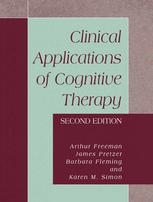

Most ebook files are in PDF format, so you can easily read them using various software such as Foxit Reader or directly on the Google Chrome browser.
Some ebook files are released by publishers in other formats such as .awz, .mobi, .epub, .fb2, etc. You may need to install specific software to read these formats on mobile/PC, such as Calibre.
Please read the tutorial at this link: https://ebookbell.com/faq
We offer FREE conversion to the popular formats you request; however, this may take some time. Therefore, right after payment, please email us, and we will try to provide the service as quickly as possible.
For some exceptional file formats or broken links (if any), please refrain from opening any disputes. Instead, email us first, and we will try to assist within a maximum of 6 hours.
EbookBell Team

0.0
0 reviewsAs practical and insightful as its predecessor, the second edition of this acclaimed text gives students of cognitive and cognitive-behavioral therapy a solid grounding in principles while modeling an integrative approach to the problems they will encounter most. The same quartet of knowledgeable clinicians who authored the original have updated and restructured their work to take readers through the best of contemporary cognitive practice, from intake interview and case conceptualization to the crucial final meetings. Their goal is to offer empirically valid interventions that truly address the complex problems of today’s clients, and this straightforward volume presents these strategies with maximum utility for trainee and clinician alike.
• Clinical vignettes and verbatim transcripts illustrating interventions in action.
• Guidelines for assessing clients throughout the course of therapy.
• Effective ways to strengthen the therapeutic relationship.
• Equal coverage on treatment of Axis I and personality disorders.
• New chapters on treatment of children, adolescents, couples, and groups.
• Techniques for getting past roadblocks, dealing with non-compliance, and avoiding relapses.
Uncovering new clinical possibilities, debunking common misconceptions, and encouraging readers to sharpen their skills, the authors show why, decades after its inception, cognitive therapy continues to get results.
The second edition of Clinical Applications of Cognitive Therapy is an invaluable source of knowledge for researchers and advanced students of behavior therapy, clinical and counseling psychology, psychiatry, and psychiatric social work, and for clinicians at all levels of practice.